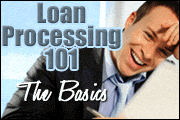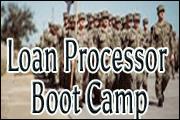Loan Processor Training For Banks
Best-Selling Training Courses:
Online Training Courses
Become A Loan Processor!
Loan processors serve as the primary gatekeepers in this field, as your firm will rely on you to appropriately screen products and identify acceptable applications. This job can bring its share of frustrations and obstacles, and loan processing classes can help professionals to improve their overall skillset and handle challenges better.
 What Does A Mortgage Loan Processor Do?
What Does A Mortgage Loan Processor Do?The three stages of every loan are the application, underwriting, and closing.
The Application stage essentially comprises the paperwork to start the process. The Underwriting stage essentially reviews your submitted paperwork, then compares it against specific metrics and rules (for instance, is the potential borrower's your Debt-To-Income (DTI) ratio within normally-accepted rules?). The Closing stage essentially includes all of the paperwork that you must sign to get your loan.
A Loan Processor facilitates the loan application process by validating the loan application information and verifying that the loan application meets established standards. You'll speak with applicants to learn more about their background and financial history, with information typically including employment situation, salary, assets, financial status, and current debts and expenses. From there, you'll help to identify appropriate loan options for the applicant.
Bottom line, the timing of the loan process - including final approval - will depend on:
- The information submitted, such as the potential borrower's tax returns, credit report, and Debt-To-Income (DTI) ratio
- The property appraisal
- The potential borrower's responses - and responsiveness - to questions

- Whether the potential borrower's financial information is deemed able to re-pay the loan
- Checking for liens or other negatives
- Validating all information
- Finalizing, then signing, all required paperwork
Work-wise, you'll need to address any questions that pop up, all while outlining loan types and terms so they understand exactly what they're considering. Once they've settled on an option, you'll need to confirm that they've completed the application accurately and in full, therefore requiring exceptional patience and attention to detail. Mortgage loan processors will have to verify the specifics of provided data, including employment length, financial statement accuracy and collateral asset values.
You also might be responsible for approving or rejecting the loan, as well as closing the process — which might involve setting interest rates and repayment terms. As one of the first points of contact for many applicants, your firm might task you with searching for new business opportunities via marketing.
Loan Processor Training Courses
To find the loan processor training courses for your training and educational needs, simply select one of the recommended courses below, or choose "Loan Processor" from the "Professional Development" section of the following search box.
Note: Click
here to see Underwriter training courses or use the "Topics" link on the menu bar above to see other mortgage-related topics, such as training for Reverse Mortgages, DE Underwriting, Tax Return Analysis, and more.
Best-Selling Training Courses:
Online Training Courses
Find Seminars, Webinars, And Online Training In Your Area
More About Being A Loan Processor
What Do Loan Processors Need To Know?Loan Processors handle the majority of the paperwork, as well as communication, with potential borrowers. Some of the work and what you'll learn by taking our Loan Processor training includes:
- Mortgage Terminology
- Processor Duties
- Overview of Conventional, FHA, and VA programs

- The Loan Cycle
- Loan Ratio Calculations
- Loan Documentation
- Disclosure Basics
- Maximum Mortgage Limits
- Appraisal review
- Credit, Income, and Asset Analysis
- Social security and pension calculations
- Credit report review
- Calculating Income, DTI, And LTV
- Hourly wage/salary wage calculations
- Tax returns analysis
- Title Commitment Review
- Loan Estimate
- TRID
- Closing Disclosure
Loan Processors Are In DemandThe mortgage industry is an ever-changing market. Whether you are new to the industry or an experienced professional, our mortgage loan processor training courses will give you the foundation you need to establish yourself in the industry, stay abreast of changes and new developments in the marketplace, and advance your career down the road.
Our mortgage loan processor training programs will give you the insider knowledge you need to provide your customers with the best possible mortgage experience. Our customized education modules will give you both the basic and advanced training that you need to extend your knowledge of mortgage products and take your career to the next level. And with the flexible online and offline formats, you can take these classes whenever and wherever your schedule permits!
Common Banker Loan Processor Errors To Avoid
Loan processors in a banking environment play a crucial role in facilitating the mortgage loan process. However, errors can occur during their tasks, potentially leading to delays, misunderstandings, or inaccuracies in loan applications - and thereby potentially causing losses. Here are some common mistakes made by banker loan processors:
- Incomplete or Inaccurate Documentation:
Loan processors must ensure that all required documentation from borrowers is complete and accurate. Common errors include missing signatures, outdated documents, or incomplete forms, which can delay the underwriting process. - Miscommunication with Borrowers:
Effective communication with borrowers is essential throughout the loan process. Errors can occur if loan processors fail to provide clear instructions, updates, or requests for additional information, leading to misunderstandings or delays in document submission. - Failure to Verify Information:
Loan processors are responsible for verifying the accuracy of information provided by borrowers, such as income, employment, and asset details. Errors can occur if processors do not thoroughly verify this information, leading to misrepresentations or inaccuracies in loan applications. - Ignoring Regulatory Requirements:
Loan processors must ensure compliance with regulatory requirements, such as TRID, UDAAP, and others related to documentation, disclosures, and consumer protections. Errors can occur if processors overlook or misinterpret regulatory guidelines, leading to compliance issues or legal risks. - Inadequate Review of Appraisal Reports:
Loan processors are responsible for reviewing property appraisal reports to ensure accuracy and compliance with lending guidelines. Errors can occur if processors fail to identify discrepancies or issues in the appraisal report, leading to incorrect property valuation or loan decisions. - Overlooking Borrower Qualifications:
Errors can occur if processors overlook important factors such as credit history, debt-to-income ratio, or loan program requirements, leading to incorrect loan approvals or denials.
By identifying and addressing these common errors, banker loan processors can improve efficiency, accuracy, and customer satisfaction throughout the mortgage loan process.
Find Mortgage Loan Processor Training For Bankers
The Bank Training Center offers multiple training formats, including seminars, webinars, video and audio training, books, CDs, and more so you never lose interest. You can tailor your training to your specific career development and learning needs, and can enjoy the flexibility of training from home, in your car, on your lunch break, or any time you have a moment to dedicate to your career advancement! Select one of our loan processor training modules today and begin advancing your career tomorrow!





